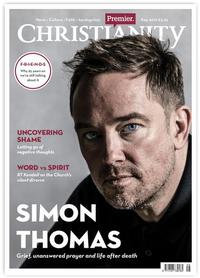
“9 million babies have been aborted since the 1967 Act,” Pauline tells me. “But for those of us who’ve had an abortion, it was just one baby. It was my baby.”
Abortion is far more common than we think. One in 3 women in the UK has at least one abortion by the age of 45, and there is every indication that this is just as true of those who can be found in churches on a Sunday morning as it is of the population at large. Even the smallest church is likely to have at least one or two people who are post-abortive.
Pauline's story
“I remember lying in the operating theatre waiting for my abortion to be performed,” says Pauline, whose own abortion took place 50 years ago. “I thought to myself: ‘Any moment now, they’ll come and put that needle in my arm, and this will all be over.’”
They did, but it wasn’t. Pauline’s abortion was the beginning, not the end, of her troubles – a downward spiral saw her finally locked up in a psychiatric ward close to suicide. But it was there that she encountered the grace of God.
“I felt that I was walking along the edge of a precipice. But Jesus was between me and that precipice.”
Over the years that followed, Pauline journeyed through deep forgiveness and healing – and an important part of that for her was encountering Christians and churches that weren’t afraid to speak about this issue.
I ask Pauline what impact it has on people in her situation when churches stay silent on the issue of abortion.
“It makes us feel that what we’ve done is so awful that they can’t help us. We feel that we are an embarrassment to the church.”
Something I’ve learned from Pauline and others over the last couple of years is that silence in the Church is not neutral. It communicates something loud and clear: Unforgivable.
“We need people to listen to us, we need to be able to tell our story.”
Breaking the silence
At a church where Pauline recently helped to break the silence, a woman responded by saying that it was the first time in decades of church involvement, as a committed Christian, that she’d been given permission to talk about her own abortion. She was so grateful, saying that she believed many women would experience important healing through this ministry. “I’m so glad I’m in a church where we can talk about abortion,” she concluded.
What would it look like if abortion were brought out into the light in your church?
“The gospel is big enough to handle abortion,” Pauline tells me. “And not just big enough to forgive, but big enough to redeem, to use what’s happened for God’s glory. One day I’ll meet my baby in heaven, and I’ll be able to tell her what a difference her life made. A positive difference, not just a tragic story. That because of her, people came to know God, that because of her, many lives were saved.”
Pauline is passionate about helping post-abortive women and men to seek and find full healing – in fact, she thinks it is our Christian duty to do so.
“The identity of ‘victim’ is not where God wants any of us to stay.”
For information on a gospel-centred approach to post-abortion recovery, visit www.brephos.org.uk
Dave Brennan is the founder Brephos, a Christian charity equipping the Church to speak out on the issue of abortion.
SPECIAL: Subscribe to Premier Christianity magazine for HALF PRICE (limited offer)





























